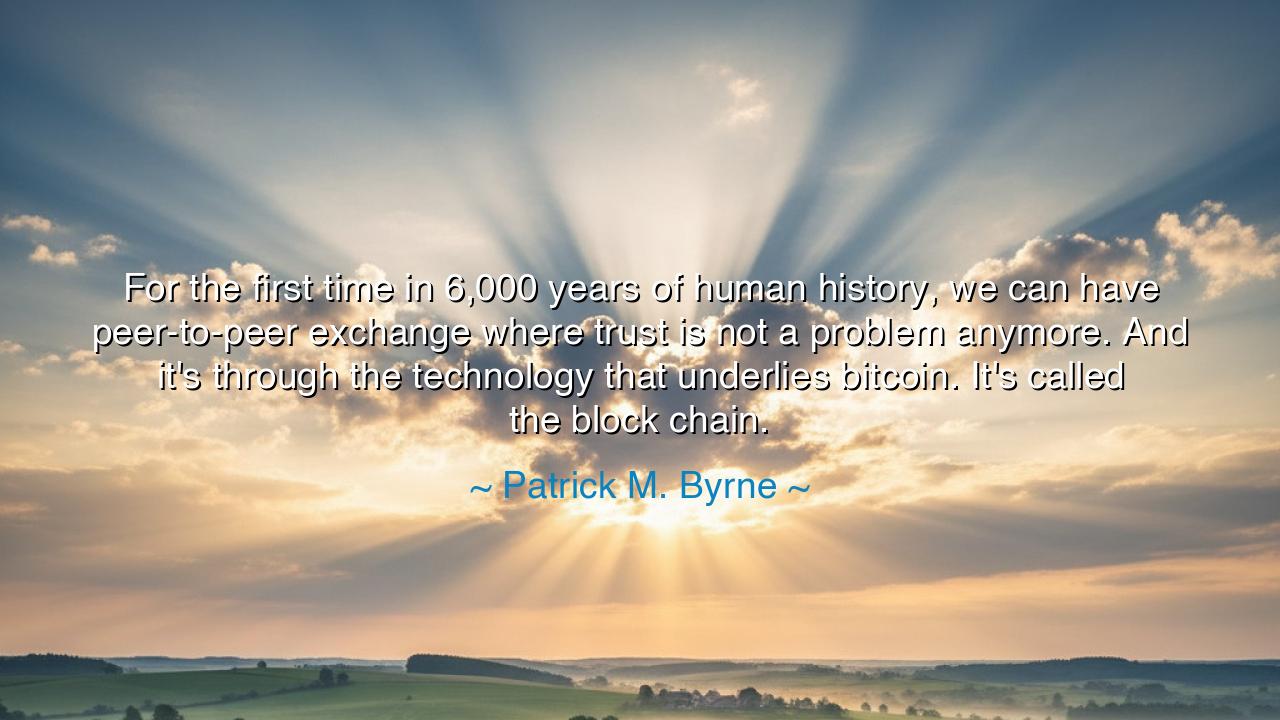
For the first time in 6,000 years of human history, we can have
For the first time in 6,000 years of human history, we can have peer-to-peer exchange where trust is not a problem anymore. And it's through the technology that underlies bitcoin. It's called the block chain.






Hear, O listeners of the new age, the bold words of Patrick M. Byrne, who foresaw a shift in the foundations of commerce and trust: “For the first time in 6,000 years of human history, we can have peer-to-peer exchange where trust is not a problem anymore. And it's through the technology that underlies bitcoin. It's called the block chain.” In this declaration is revealed not only a technological marvel, but a revolution in the very way human beings bind themselves to one another. He speaks as one who looks backward across millennia and forward into the unknown, proclaiming that an ancient chain of dependence may at last be broken.
For throughout 6,000 years of human history, men and women have needed intermediaries to trade. In the dawn of civilization, merchants at market required witnesses, scribes, and rulers to guarantee that their word was true. Clay tablets in Sumer bore records of grain, not because men trusted one another, but because they did not. Banks, courts, and governments arose to fill this void, standing as guardians of contracts and keepers of ledgers. Yet these guardians, while useful, also became masters, taking fees, wielding power, and sometimes betraying the very trust they were meant to preserve.
Byrne proclaims that with blockchain, this long cycle may be broken. For in this technology, the ledger itself becomes incorruptible, open to all, unowned by any. No king, no banker, no priestly scribe is required to affirm it, for its truth is carried in the consensus of many and locked in cryptographic stone. Thus, the ancient problem of trust between strangers is transformed. The buyer and seller, the lender and borrower, the giver and receiver—each may deal peer-to-peer, confident not in the word of man, but in the unchanging witness of the chain.
Consider, O listener, the story of the Medici bankers of Renaissance Florence. Their power arose because people across Europe needed a trusted house to move money safely. The Medici prospered as keepers of accounts, yet their dominance also concentrated wealth and political might in their hands. Imagine, as Byrne does, a system where such trust no longer had to be given to a single family or institution, but was distributed across a vast and incorruptible network. The blockchain, in this sense, is a reimagining of history itself, dissolving what was once bound in the vaults of the few.
Yet with such promise comes danger. For though the blockchain may solve the problem of trust, it does not solve the problem of the heart. Men may still exploit, deceive, and oppress, though their records be flawless. Technology is but a mirror, reflecting the values of those who wield it. As fire warms or destroys, as the sword defends or slays, so too can blockchain liberate or entrap. Byrne’s vision is mighty, but it requires that the wisdom of humanity grow alongside its tools.
The lesson, then, is clear: the true revolution is not in technology alone, but in how we choose to wield it. The peer-to-peer exchange Byrne speaks of is more than financial—it is human. It calls us to meet one another without fear, to build systems that do not demand blind trust in rulers or institutions, but instead empower all to participate in fairness. Yet it also calls us to remember that no chain of code, however strong, can replace integrity of character.
Therefore, O children of tomorrow, take Byrne’s words as both promise and charge. Embrace the tools that make trust possible without tyranny. Learn of the blockchain, and see in it not only the power to trade wealth, but the potential to share knowledge, governance, and even justice. But above all, remember: the greatest ledger is not written in code, but in the actions of your life. Build trust not only in machines, but in the way you walk among others. For only then will this new dawn truly “fundamentally change the world.”






AAdministratorAdministrator
Welcome, honored guests. Please leave a comment, we will respond soon